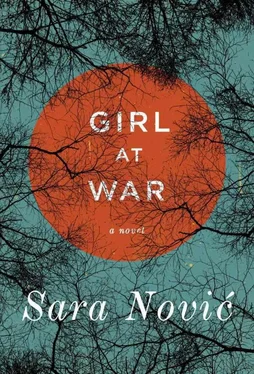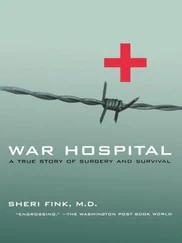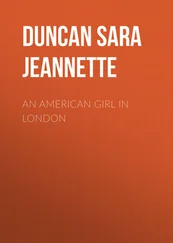“But he’s not okay?” I said.
“Of course he’s not. He was one of the smartest in our class and now he’s a shirtless pirate bartender.”
Tomislav reappeared with a case of beer and was loading the bottles into a fridge beneath the bar top.
“Sorry it’s a little warm,” he said, thrusting a beer into my hand. “On the house. Welcome back.” He winked, and I chalked another line on my invisible tally of “orphaned by war.”
Tomislav poured three shots of vodka, and we clinked glasses. Then, called into service by a pair of giggly bleach-blondes, he left Luka and me alone to nurse our beers. I could feel the vodka bubbling at the bottom of my stomach and reddening my cheeks.
“Hey, do you—” Luka paused, looking uncertain. “Want to go dance?”
I followed him back inside to the dance floor, and for a moment I missed Brian. I hadn’t danced with anyone but him for a long time. Now Luka and I were taking care not to touch one another, but the room was packed and we were pressed together by the swell of the throng. The first time I jerked away. Despite the crowd and the dark I felt exposed, too aware of my body, unsure what to do with my arms. I had never been a very good dancer and usually tried to make a joke of it. Now I was finding comfort in the fact that Luka was even worse than I was — he was biting his lower lip in concentration, always half a second behind the downbeat. Still, the next time we touched we lingered for a moment. There was something pleasant about the feeling, but, when I looked up at Luka, I could not read his face. I wondered what he was thinking, then remembered Brian again and felt guilty.
Luka leaned in, his face close to mine. “Want another beer?”
“Definitely.” He pressed his way back toward the bar, and I stood alone swaying to the music. When he returned he slapped me on the back like one of the guys, and I took a slug from the bottle and felt the old Luka again.
—
In the dead of night I woke on the couch short of breath. Luka and I had come home late; judging from the color of the sky I’d only been asleep for an hour or so. I crept into the kitchen and searched the desk until I found the address book. I located Petar and Marina, their details in Ajla’s slanted script. Next to the entry she’d drawn an asterisk, with no other markings beside any other entries on the page. I’d never paid close attention to their address when I was young, but the street name was familiar. I started to dial their number, but hung up halfway through. I pulled on jeans and sneakers, slipped sideways through the front door, and set out on Luka’s mother’s bicycle.
I’d never been out in Zagreb alone at this hour. The sky was navy blue and the roads were empty, the desertedness both tranquil and eerie. Occasionally I passed a bakery — the only storefronts with their lights on — and caught the scent of tomorrow’s bread.
The cool air swept my hair back, and I felt more at ease on the bike. Petar and Marina’s building was a few miles away, but the road was flat and I pedaled quickly, stopping only to check the address I’d written on the inside of my wrist. They lived on the second floor, so I left the bike in the lobby, hopeful that no one would be awake to steal it, and took the stairs.
When I reached number 23 I began to get nervous. Why had I thought this was a good idea? I tapped on the door, lightly at first, then more forcefully. Finally I knocked so loudly a man wearing only slippers and underpants appeared in the adjacent doorway.
“Cut the racket.”
“Excuse me, sir,” I said, employing the most formal language I could muster. “Sorry to wake you, but do you know if the Tomićs are home?”
“Who the hell are you?”
“I’m Ana. I’m an old friend.”
“Well, they haven’t lived here in ages! Kovačs live there. Three kids. Noisy fuckers.”
“How long have the Tomićs been gone?”
“About ten years now.”
“Do you know where they went?”
“Moved back down to someone’s grandfather’s place. Mimice or Tiska or something. Well, I don’t know about Petar. He was in the war. Who did you say you were again?”
“Well—”
“Fucking hell, forget it,” he said, and went back inside.
Downstairs I pushed the bike out into the street and sped down Ilica, where the early risers were just waking up.
The next afternoon it was so humid we barely moved.
“I don’t understand how you’ve managed to import Walker, Texas Ranger but not air-conditioning,” I said, gesturing at the television. Luka looked for an instant as if he wanted to throttle me, but he didn’t reply. It was too hot to fight.
Luka and his father wandered the house in their underwear. Luka was lean and lithe, understated muscles rippling as he paced the living room. I looked him up and down; he was about Brian’s height. Thinner legs, but broader shoulders. Darker skin. It was a good body, desirable even, and I liked looking at it, could feel my eyes lingering on his abs as he passed. But there were the other parts of Luka — the small smile, the wiry black hair standing on end — that had stayed the same. In those parts he was ten to me.
Miro’s stomach hung low over the band of his briefs, a tub of pasty flesh in stark contrast with the deep tan of his forearms, which his summer police uniform exposed. He was sweating from places I didn’t know one could sweat, and it was gathering in creases of parts that shouldn’t have been creased. The house was filled with the tang of bodies.
“I’ve been thinking,” I said, trying to sound nonchalant. “You wanna go somewhere?”
“Like for a pizza?”
“Tiska.”
“Tiska. You sure you want to go down that way, on the southern road?” There was only one main road that spanned the country north to south. A day’s drive from Zagreb to Split, then a few smaller offshoots to take us the rest of the way down to Tiska.
“I’ll be fine.”
“I heard you leave last night.”
“I couldn’t sleep. I just went for a bike ride.” He knew I was lying, I could tell, but he had seen history blaze across my pupils, and left it alone.
“I’ll see if I can get the car.”
In the morning Luka began a campaign of pleading with his mother to let us borrow the family Renault 4. As children we’d been much freer than American ten-year-olds, but now there’d been a strange reversal: Luka and all the other university students were living at home, beholden to their parents.
In the end it was unclear whether or not we’d actually gotten permission to take the car, but we acted as if we had, Luka palming the keys from their nail on the wall. The car, which had once been white, was now mostly rust. We packed the trunk with clothes, water jugs, two orange blankets, and a machete from the shed and left without saying goodbye, in case we weren’t supposed to be going.
We stopped at the grocery store for provisions. We filled a cart with cases of milk — the kind in cardboard boxes that doesn’t need to be refrigerated — bags of granola, farmer cheese, and a fresh loaf of black bread. In the first winter of the war, after my parents had been killed and we were hungry, Luka and I had swept through this same store, gathering packets of powdered soup and carrying them to the pet food aisle, which no workers monitored. We tore at the packaging with our teeth and passed a packet between us, salty and stinking of onions. In Croatia, at the start of 1992, this did not feel like stealing. I glanced at Luka for any sign of this memory, but he had probably been in the store hundreds of times since then, and he pushed the cart toward the checkout. We paid.
A few minutes later, before we’d reached the highway entrance, Luka pulled off the road into the parking lot of the technical high school.
Читать дальше












